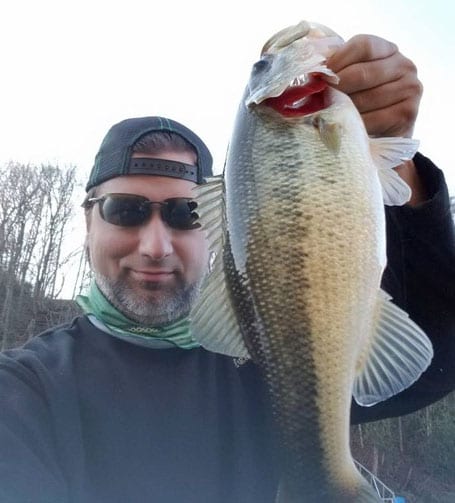Winter can be a gamble for the angler trying to salvage a cold water bite. Lakes are dipping as low as the upper 30’s in high elevations, and the 40’s in lower elevations in the mountains. It can pose a challenge of will and patience, which is the ultimate test for the best of anglers. The ups and downs in the winter can either pay out or be a total bust.
I find that, in the winter, downsizing and presenting a slow presentation will bring in some quality bites but in some cases, a fish won’t bite unless the meal is big enough to make the effort worth it. During this time, upsize and finesse fish with big lures. Fish get lazy and lethargic with their metabolism rates slowing down to conserve calories, so they want a big meal without wasting energy to get it.
When downsizing, you’ll want to use light line such as a 4 to 6-pound fluorocarbon and a light action rod. In upsizing you’ll have to use the lightest gear possible that you can get away with. This will allow you to “finesse fish” those big lures.
Your electronics or your fish finder will play an important role in finding where the fish are, at what depth, and the temperature to help with your plan of action. Without your electronics, it’s a “needle in a haystack” scenario, but it can be done. The “old timers” developed the art of search and destroy and each had their own way. If you could take one of these anglers with you in the winter, you’ll see an extra sense being used as a radar.
If you’re the fair weather angler, this is the perfect opportunity to get your reels serviced and gear organized and ordered. Check your line to see if it needs replacing. You really need to replace it once a season because of exposure to the elements. If you’re thrifty, which a lot of anglers are, you’ll know when it’s time to replace as breakage becomes an issue. It’s good to have line with you when it gets too brittle to use. You don’t want to get on a good bite in the spring and find you can’t even pull a fish in.
If you’re not using your boat in the winter, make sure you protect your investment by winterizing and using a good cover to keep the moisture out of your boat. The motor will need an oil change in the lower case, to remove water that the seals may have let in. Motors with carburetors need to be level to allow the fuel to drain. I like to remove the spark plugs and spray WD-40 in the void where it was. The fuel in the tanks needs to be filled to “full” to stop condensation from starting, or a fuel treatment can be added to stop fuel from separating.
Scott Norton is a native of Western North Carolina. Born in Asheville, NC, he is a long time avid hunter, angler, and weekend warrior.
